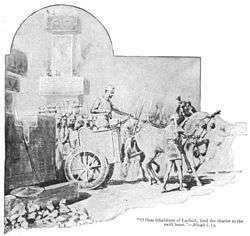Micah 3
| Micah 3 | |
|---|---|
 An illustration of Micah 1:13: "O thou inhabitant of Lachish, bind the chariot to the swift beast." (www.ordination.org). | |
| Book | Book of Micah |
| Bible part | Old Testament |
| Order in the Bible part | 33 |
| Category | Nevi'im |
Micah 3 is the third chapter of the Book of Micah in the Hebrew Bible or the Old Testament of the Christian Bible.[1][2] This book contains the prophecies spoken by the prophet Micah, and is a part of the Book of the Twelve Minor Prophets.[3][4]
Text
- The original text is written in Hebrew language.
- This chapter is divided into 12 verses.
Textual versions
Some most ancient manuscripts containing this chapter in Hebrew language:
- Masoretic Text (10th century)
- Dead Sea Scrolls: (2nd century BC)[5][6]
Ancient translations in Koine Greek:
- Septuagint (3rd century BC)
- Dead Sea Scrolls: (2nd century BC)[5]
- Naḥal Ḥever (8ḤevXIIgr): extant: verses 5-6[5]
- Theodotion version (~AD 180)
Structure
NKJV groups this chapter into:
- Micah 3:1-12 = Wicked Rulers and Prophets
Verse 2
- Who hate the good,
- and love the evil;
- 'who pluck off their skin from off them,
- and their flesh from off their bones;[7]
- "'Who hate the good, and love the evil": Man, at first, loves and admires the good, even while he cloth it not; he hates the evil, even while he does it, or as soon as he has done it. But man cannot bear to he at strife with his conscience, and so he ends it, by excusing himself and telling lies to himself. And then, he hates the truth or good with a bitter hatred, because it disturbs the darkness of the false peace with which he would envelop himself. At first, men love only the pleasure connected with the evil; then they make whom they can, evil, because goodness is a reproach to them: in the end, they love evil for its own sake Romans 1:32. pagan morality too distinguished between the incontinent and the unprincipled, the man who sinned under force of temptation, and the man who had lost the sense of right and wrong John 3:20. "Everyone that doeth evil, hateth the light. Whoso longeth for things unlawful, hateth the righteousness which rebuketh and punisheth" .[8]
- "Who pluck off their skin from off them": They are not shepherds, but butchers. We have the same figurative expression for merciless extortion and pillage. Ezekiel makes a similar complaint (Ezekiel 34:2-4).[9]
- "Pluck off their skin from off them, and their flesh from off their bones": Rob their fellow countrymen of all their substance (Psalm 14:4; Proverbs 30:14).[10] So the Targum, "seizing on their substance by violence, and their precious mammon they take away."[11]
Verse 12
- Therefore because of you
- Zion shall be plowed like a field,
- Jerusalem shall become heaps of ruins,
- And the mountain of the temple
- Like the bare hills of the forest. (NKJV)[12]
Cited in Jeremiah 26:18
- "Temple": literally "house".[13]
See also
- Related Bible parts: Psalm 14, Proverbs 30, Jeremiah 20, Jeremiah 26, Ezekiel 34, Ephesians 3
Notes and references
- ↑ Collins 2014.
- ↑ Hayes 2015.
- ↑ Metzger, Bruce M., et al. The Oxford Companion to the Bible. New York: Oxford University Press, 1993.
- ↑ Keck, Leander E. 1996. The New Interpreter's Bible: Volume: VII. Nashville: Abingdon.
- 1 2 3 4 5 Dead sea scrolls - Micah
- ↑ Timothy A. J. Jull; Douglas J. Donahue; Magen Broshi; Emanuel Tov (1995). "Radiocarbon Dating of Scrolls and Linen Fragments from the Judean Desert". Radiocarbon. 38 (1): 14. Retrieved 26 November 2014.
- ↑ Micah 3:2
- ↑ Barnes, Albert. Notes on the Old Testament. London, Blackie & Son, 1884. Reprint, Grand Rapids: Baker Books, 1998.

- ↑ Joseph S. Exell; Henry Donald Maurice Spence-Jones (Editors). The Pulpit Commentary. 23 volumes. First publication: 1890.

- ↑ Robert Jamieson, Andrew Robert Fausset; David Brown. Jamieson, Fausset, and Brown's Commentary On the Whole Bible. 1871.

- ↑ John Gill. John Gill's Exposition of the Entire Bible. Exposition of the Old and New Testament. Published in 1746-1763.

- ↑ Micah 3:2
- ↑ Notes in New King James Version on Micah 3:12
Bibliography
- Collins, John J. (2014). Introduction to the Hebrew Scriptures. Fortress Press.
- Hayes, Christine (2015). Introduction to the Bible. Yale University Press.
External links
Jewish
Christian
This article is issued from
Wikipedia.
The text is licensed under Creative Commons - Attribution - Sharealike.
Additional terms may apply for the media files.